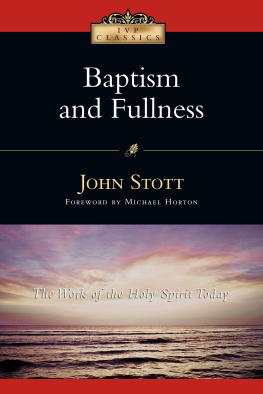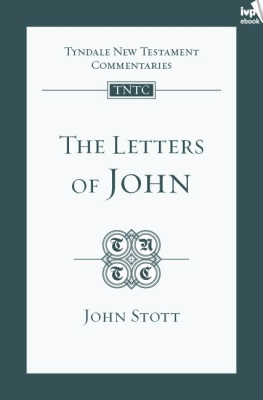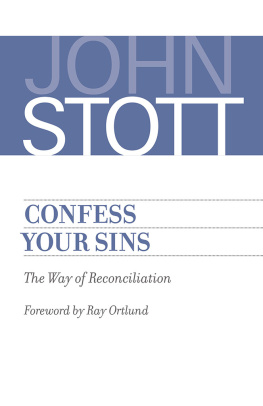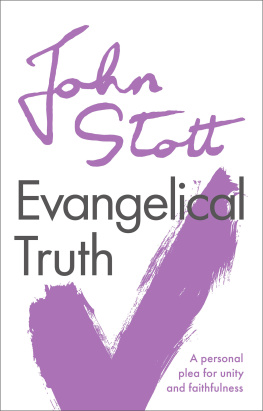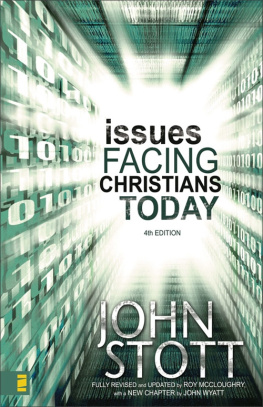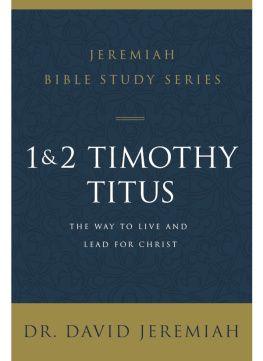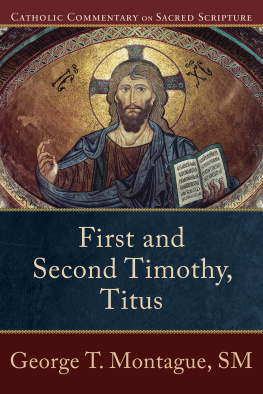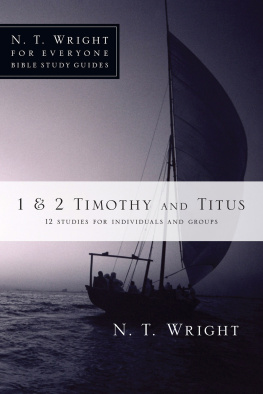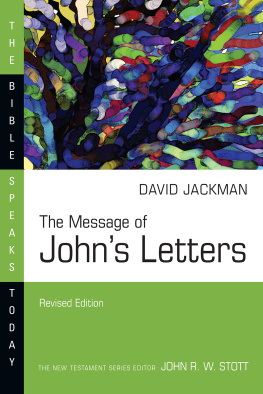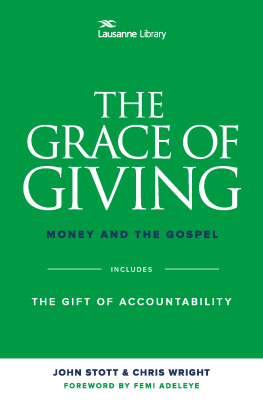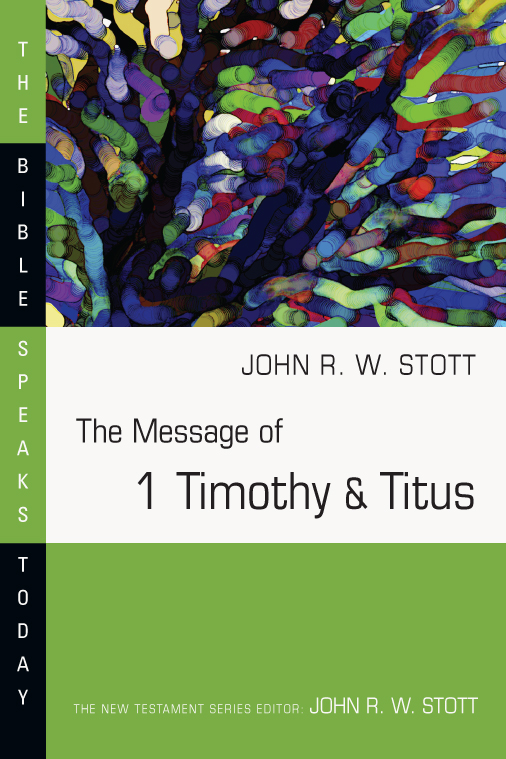General preface
THE BIBLE SPEAKS TODAY describes three series of expositions, based on the books of the Old and New Testaments, and on Bible themes that run through the whole of Scripture. Each series is characterized by a threefold ideal:
- to expound the biblical text with accuracy
- to relate it to contemporary life, and
- to be readable.
These books are, therefore, not commentaries, for the commentary seeks rather to elucidate the text than to apply it, and tends to be a work rather of reference than of literature. Nor, on the other hand, do they contain the kinds of sermons that attempt to be contemporary and readable without taking Scripture seriously enough. The contributors to The Bible Speaks Today series are all united in their convictions that God still speaks through what he has spoken, and that nothing is more necessary for the life, health and growth of Christians than that they should hear what the Spirit is saying to them through his ancientyet ever modernWord.
ALEC MOTYER
JOHN STOTT
DEREK TIDBALL
Series editors
Authors preface
It was as a comparatively young man that I began a serious study of the Pastoral Letters, so that I found no problem in sitting beside Timothy and Titus, listening through their ears to the elderly apostles admonitions. But now the situation has changed. I am almost certainly older than the apostle was, and it is natural for me to sit beside Paul. Not of course that I am an apostle. But I think I feel something of his concern for the future of the gospel and for the younger generation whose responsibility it is to guard it and pass it on. It is an interesting hermeneutical question whom one may or should identify with when reading Scripture.
My first attempt to expound all three Pastoral Letters was during the fall term of 1972, when I was invited to lecture on them at Trinity Evangelical Divinity School outside Chicago. But before that during the sixties I had preached through them in All Souls Church in London. Then 2 Timothy was the set text for the biblical expositions at the great student missionary convention at Urbana in 1967, and at the Keswick Convention in Britain in 1969. Those studies of 2 Timothy were expanded and published in 1973 as one of the early Bible Speaks Today books under the title Guard the Gospel. 1 Timothy then became my set text for the Australian Church Missionary Societys Summer Schools in 1986, and for Commission 88, the East African student missionary conference, which was held outside Nairobi at the end of 1988.
So this penultimate Bible Speaks Today book in the New Testament series (due to be completed with an exposition of Matthews Gospel by Michael Green) focuses on 1 Timothy and Titus. I address the question of the authenticity of the Pastoral Letters in an introductory chapter. In this preface I limit myself to their relevance to the contemporary world and church, especially the relevance of 1 Timothy and Titus.
The relevance of 1 Timothy and Titus
To draw up a list of topics to which these two letters make a substantial contribution is to compile an extraordinarily heterogeneous assortment. I have sub-titled the exposition of 1 Timothy The life of the local church. For it contains apostolic instruction on the priority of prayer, on gender roles in the conduct of public worship, on the relations between church and state, and on the biblical basis for world evangelization. The apostle goes on to write about local church leadership, the conditions of eligibility for the pastorate, and how young leaders can ensure that their ministry is accepted, and not despised or rejected on account of their youth. Other subjects include the doctrine of creation, and its application to our everyday behaviour, the principles governing the churchs social work, the remuneration and disciplining of pastors, the superiority of contentment over covetousness, the call to radical holiness, and the dangers and duties of the rich.
The exposition of Titus I have sub-titled Doctrine and duty, for, although the context is still the local church, the emphasis has shifted. Pauls chief concern now is that, in the three spheres of the church, the home and the world, our Christian duties in this present age will be enforced by the comprehensive doctrine of salvation, and especially by the past and future appearings of Christ.
But the apostles overriding preoccupation throughout all three Pastoral Letters is with the truth, that it may be faithfully guarded and handed on. The pertinence of this theme, at the end of the twentieth century, is evident. For contemporary culture is being overtaken and submerged by the spirit of postmodernism. Post-modernism begins as a self-conscious reaction against the modernism of the Enlightenment, and especially against its unbounded confidence in reason, science and progress. The postmodern mind rightly rejects this naive optimism. But it then goes further and declares that there is no such thing as objective or universal truth; that all so-called truth is purely subjective, being culturally conditioned; and that therefore we all have our own truth, which has as much right to respect as anybody elses. Pluralism is an offspring of postmodernism; it affirms the independent validity of every faith and ideology, and demands in shrill tones that we abandon as impossibly arrogant any attempt to convert somebody (let alone everybody) to our opinion.
In contrast to this relativization of truth, it is wonderfully refreshing to read Pauls unambiguous commitment to it. He has himself been appointed, he says, a teacher of the Gentiles in faith and truth (1 Tim. 2:7, RSV ); the church is the pillar and foundation of the truth (1 Tim. 3:15); and it is the truth which leads to godliness (Tit. 1:1). The false teachers, on the other hand, have wandered away from the truth and even oppose the truth (1 Tim. 6:21; 2 Tim. 2:18; 3:8; cf. 4:4).
As the apostle develops his thesis, we become aware of the existence of four groups of people, and of the interplay between them, namely Paul and his fellow apostles, the false teachers, Timothy and Titus, and the pastors they are to select and appoint.
First, there is Paul himself, who styles himself at the beginning of all three letters an apostle of Jesus Christ, adding in two of them that his apostleship is by the will or the command of God. And all through these letters his self-conscious apostolic authority is apparent, as he issues commands and expects obedience. Also, again and again, he refers to what he calls indiscriminately the truth, the faith, the sound doctrine, the teaching or the deposit. The plain implication is that a body of doctrine exists, which, having been revealed and given by God, is objectively true. It is the teaching of the apostles. Paul constantly calls Timothy and Titus back to it, together with the churches they oversee.
Secondly, in opposition to Paul, there are the false teachers. They are heterodidaskaloi (1 Tim. 1:3; 6:3), engaged in teaching what is heteros , different from and alien to the teaching of the apostles. They are essentially deviationists, who have wandered or swerved from the faith (1 Tim. 1:6; 4:1; 2 Tim. 2:18). Paul does not mince his words. What they are spreading is not an alternative truth, but lies, godless chatter, myths and meaningless talk.
Thirdly, there are Timothy and Titus. They stand between the apostle and the church, in the sense that they represent him and relay his teaching to the church. They have been appointed to oversee the churches in Ephesus and Crete respectively, yet their job specification has been written by Paul. Twice in his first letter to Timothy he tells him that he hopes to visit him soon (3:14; 4:13). Meanwhile, during his absence, Timothy is to devote himself on the one hand to the public reading of Scripture, basing his teaching and exhortation on it, and on the other to Pauls written instructions. Indeed, Pauls written teaching was, in the providence of God, a deliberate substitute for his personal presence and direction of the church. This is why as many as ten times in 1 Timothy and Titus Paul writes teach these things, command and teach these things, or give the people these instructions. On each occasion tauta (these things) means the teaching which Paul is giving Timothy and Titus. They are not only to hold on to it themselves, guarding the precious deposit of truth (1 Tim. 1:19; 3:9; 6:20), and to fight for it against the false teachers (1 Tim. 1:18; 6:12), but also to pass it on faithfully to the church.


